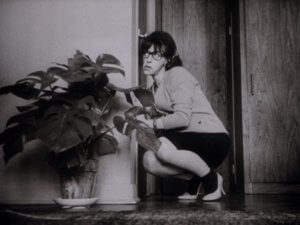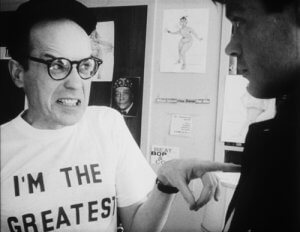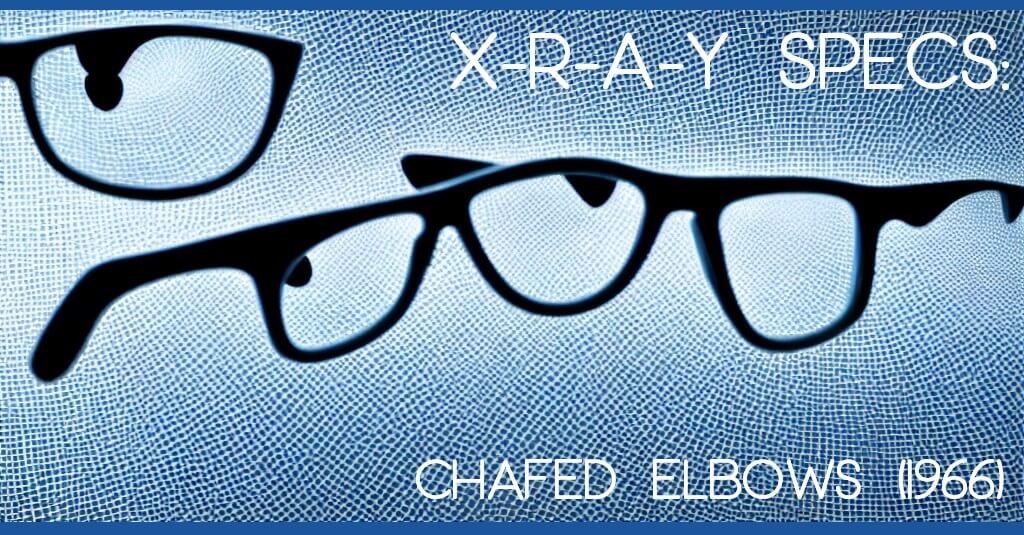Welcome to X-R-A-Y Specs, a film roundtable in which four of our radiological technicians converse about movies. This edition’s selection is Chafed Elbows, an underground film from 1966 directed by Robert Downey, Sr.

Katharine Coldiron: Well, I didn’t want to start this off, but here we go: I didn’t like this movie. I found it obnoxious beyond belief, like Lenny Bruce mixed with early Woody Allen made by someone who’d seen La Jetée but didn’t have the skill to recreate it. With some Peter Sellers circa Casino Royale folded in. I would’ve turned it off within 15 minutes if it hadn’t been necessary to keep watching. I’m impressed that it was made for so little money and that a vision was doggedly stuck to, but I thought that vision was foolish, faddish, and somewhat contemptible, and was very happy when it was over.
Tex Gresham: Fair enough. It’s forgotten comedy (a style some people wish would stay forgotten), but having grown up around men who made jokes like this and had this type of humor in their DNA, I can’t help but regard this style of humor as one would a sacred text. For your money, few movies have as many comedic beats per minute as this one. But regardless of preference or taste, it’s hard for me to not emphasize the importance this film had in the New York underground film movement in the late 60’s. It was made cheaply and through a mode that opened a lot of people’s eyes as to how you can make a film – and even did so in 2012 when I watched it for the first time. It’s intentionally antagonistic, a middle finger to pretension. It’s a filmmaker doing whatever he wants, how he wants it, in whatever way he can.
Funny thing though: RDSr. made this in response to La Jetée because he thought Chris Marker’s film wasn’t good. Guess he thought it needed more incest.
 Jillian Luft: Oh yes, the incest was compelling because I thought, oh yay!, I’m watching a proto-John Waters film. But then it went in other WTF directions that, at times, were…er, less compelling. It’s an impish little film and I respect that. But it’s not necessarily an enjoyable film nor is it challenging in a cerebral way. It’s part romp/part slog.
Jillian Luft: Oh yes, the incest was compelling because I thought, oh yay!, I’m watching a proto-John Waters film. But then it went in other WTF directions that, at times, were…er, less compelling. It’s an impish little film and I respect that. But it’s not necessarily an enjoyable film nor is it challenging in a cerebral way. It’s part romp/part slog.
Even if not directly influenced, I couldn’t help but think that Chafed Elbows paved the way for the contemporary absurdist/mondo/surreal antics of Tim and Eric or even I Think You Should Leave. There’s something about this film that remains fresh and vibrant and boundary-pushing even though it’s very of its countercultural moment.
Of course, it can be regarded as a parody of its time but also seems to be outside its time altogether. I think it’s because it reads as so personal and idiosyncratic. I’m not even sure RDSr. made this movie with an audience in mind. I think he made it for himself and a few of his buddies that might get a kick out of it while they guzzled Sazeracs or something. And I love that.
What I really did not love is how some of the comedy reminded me of Monty Python, a brand of funny which, once again, I have to confess in this column that I pretty much detest. I don’t get British humor. Or I do, but it doesn’t tickle my frontal cortex into primal laughter. Instead, it rubs like sandpaper against the wrinkles of my brain. I can’t explain it. It’s a type of clever comedy that isn’t warm and winking. Instead, it’s cocking an eyebrow at me while dressed up in a suit three sizes too big.
Pardon me, I’m using surrealist, nonsensical metaphors here. I think RDSr. would approve. And if he doesn’t, so fucking what? After watching Chafed Elbows, I feel empowered to do and say whatever I want.
Rebecca Gransden: I like the wildness of it, the mischief. Comes across as a paean to creative freedom. Must’ve been an exhilarating time when this emerged. It’s bratty and obnoxious, punk essentially, and a masterclass in the grand art of taking the piss. It does relish slaughtering sacred cows and if it was only dealing in sarcastic mockery it wouldn’t’ve held my interest, but it’s smart and playful. It’s a sign of a healthy culture when there is space for art of this type. The humor does that thing of taking an idea or concept and inflating it to such a ridiculous level or exaggerated endpoint that its absurdity is laid bare.
In addition to the US counterculture impact Tex refers to, I see a lot of British humor in this. Apart from a few brilliant visual gags and the use of editing as commentary on types of film and filmmaking itself, Chafed Elbows could very well be enjoyed on a purely audio level, the dialogue is so strong. Has the feel of a comic radio play about it, embracing the surrealism of something like The Goon Show, and Spike Milligan especially. I thought of John Waters as well, in that we are dealing in trash cinema, with characters treated as grotesques. Elsie Downey is a hoot in this film, giving a truly great comedic performance, or performances, seeing as she plays multiple parts. Her unselfconsciousness and timing are a treat.
I must hold my hands up and say that I am biased regarding this director as I consider Putney Swope to be one of the great American films, and Chafed Elbows does display the spirit that goes on to inject that film with what makes it so vital.
I love that fact about La Jetée. I assumed the choice to use stills for some of the narrative must’ve been as a result of budgetary constraints, but knowing that is highly amusing. What a cheeky guy Downey Sr. was!
 JL: Elsie Downey ruled. She truly inhabited each outlandish character.
JL: Elsie Downey ruled. She truly inhabited each outlandish character.
And, yes, I agree with Rebecca. This is trash cinema trying to mask its stink with a whiff of pop surrealism. The comedic anti-narrative is brash and revolting and inane. I do wonder if RDSr. intended for his audience to glean any meaning beyond: Aren’t our lives and times truly fucking ridiculous? The fragmented incoherence of the story it tells seems to beg for the viewer to treat what they’re seeing as ephemeral and, ultimately, disposable. Something that puzzles and titillates and provokes but only for as long as its runtime. Unlike my indelible viewing experience of Putney Swope, I can only recollect random images from this film. I gave it very little afterthought and, honestly, had to rewatch several scenes again to jog my memory, as my notes read as vague and senseless.
KC: It didn’t bother you that so much of the comedy was dated? Related to this specific moment in American culture, and/or NYC culture? As I was watching I kept thinking of other films I’ve seen that are this attached to their time and place — social problem films from the 1930s, war films from the 1940s, dance films from the 1980s — and feeling about the same way here as I do there: only by putting myself in that context do I begin to see how this film even exists. After that I can potentially make my way to how the film compels me. I got past the first step, but I got stuck in the second step, because I didn’t think any of this comedy was funny; I thought it was tired, the way all the female comic characters sounded like Mae West and all the male comic characters sounded like Groucho Marx. And I thought it was insulting. Not just to certain groups of people that it insults by name but to me, watching. This film lashes out at everyone who isn’t of a particular social/economic group, and I felt the sting.
This is all me dumping and bitching, but I do have a lasting, relevant question: what happens to art (movies, social problem novels, protest poetry) when its context expires? Do we regard it as historically useful if we fucking hate absorbing it as art? Does art have to be timeless to be art rather than history? Chafed Elbows is useful for understanding countercultural perspectives on New York and America in 1966 — immediately before “counterculture” would have a very particular meaning — but I’m not so sure it’s useful as art for art’s sake.
Then again, I’m the only one here who didn’t like it.
RG: I suppose the first question when addressing that is who decides what art is only valuable as “of its time?” It’s true that the film is a social document, but I don’t think that’s solely where it can be categorized. Taste does come into this. I’m sure there were many contemporary to Downey Sr. who wished he’d been consigned to history immediately. I don’t know, art of this type will only ever have a niche audience, one that will only diminish further over time, as full appreciation by those inclined is probably at its peak within the scene from which it emerges. But I still think there is a lot of value here, and the fact that it isn’t going to be universal isn’t a problem for me.
This is a deep question, as it raises the question of what art is and what its function “should” be, and there is obviously not one answer to this. I enjoyed being transported to this particular time, and, for me, curiosity and expanding my understanding trumps any discomfort I might experience with a piece of art. What I most appreciate about Chafed Elbows is the creativity, and independent spirit, and that is relevant to anyone, of any time. I do agree that the humor is dated and at times it does lean too much into zaniness, which can be eye-rolling, but I found the wordplay great. I do have a dark sense of humor, and some of the lines I found very funny, but I process some offensiveness at an absurdist level, and realize that is not the case  for everyone. Art of the type of Chafed Elbows will always have a limited audience, and it’s far from the top of my list when it comes to this director, but I appreciate the energizing spirit of it.
for everyone. Art of the type of Chafed Elbows will always have a limited audience, and it’s far from the top of my list when it comes to this director, but I appreciate the energizing spirit of it.
In a wider sense, addressing the main point you make regarding art made in response to a very specific set of cultural motivations and circumstance, I find categorization on this level tough to pin down. For many, art is about transportation, so the fact that it is so “of its time” might actually add more artistic value, rather than less, for some people. The specificity of it, and its distance, is like visiting another mode of thinking. For some, the wavelength won’t resonate, others will get something out of it, maybe through the mere act of experiencing the new, or in an aesthetic sense, or out of curiosity, any number of ways. We all experience art on so many levels, and differently at various stages of our lives. For some artists, discomfort and agitation is a motivating factor. To me, art of this type, Chafed Elbows being a good example, will most likely be sought out by the relatively few who will get something out of it, while everybody else will enjoy not ever seeing it. Time sifts, and art with enduring value usually persists naturally, even if only in certain circles.
JL: Huh, I think there is something timeless about Chafed Elbows, which I alluded to earlier in this conversation. Not timeless in the way that it’s a bona fide classic with universal appeal. Hell no. But it perfectly encapsulates the renegade spirit of cinema, which still exists even if in smaller and more obscure pockets in the industry. One could argue that Chafed Elbows’ spirit is a precursor to the eventual sea change of 70s cinema, tying it to that specific moment in time, but I found its daring and wacko vibe heartening even in this current moment.
I value this movie even if I didn’t derive pleasure from it. I’m not going to giddily recommend it to anyone I know (sorry, Tex.) Still, it’s a novel cinematic experience. I’ve never seen a movie open with an incest scene as a sight gag.
As gross as this sounds, my lens for viewing was as a fellow creator of art rather than a cinephile. I could dig the singular vision of RDSr. and how he executed it with obvious limitations (financial or otherwise). I’d consider RDSr. a minor influence even if our humor, tastes or aesthetics aren’t in alignment. He was most certainly doing his thing. And better yet, had the support and participation of his partner and friends. Isn’t that what every artist wants? To do the thing in the way they want to do it and have everyone they care about want that for them, too?
Maybe instead of being easily classified as art or history, Chafed Elbows is a more ambiguous third thing: an artifact of inspiration, a time capsule that reads as a letter to the future. And it says: Hey, make art! You can do whatever with little means and ample moxie. Just fucking do it already!
 TG: Shit, I wouldn’t recommend it to anyone. But if there was ever a place to have a conversation about it, it’s here in this recurring film article.
TG: Shit, I wouldn’t recommend it to anyone. But if there was ever a place to have a conversation about it, it’s here in this recurring film article.
The humor works for me because it’s still funny regardless of context. It’s abusive in the right way, in that it is both working VERY hard for the laughs while not giving a shit if you find it funny – because the filmmaker is watching it laughing his head off. And that, to me, removes any need for context or timeliness or anything like that. I think trying to find anything other than the surface watch in something like this is a trap the filmmaker hopes you fall into during your watch. If you watch one of his later movies – and even his most famous, Putney Swope – Downey Sr. is doing the same thing. He’s making a narrative that on the surface says something, maybe, could be if you want it to, but what he’s really doing is making a movie that loses you as you lose yourself in it. His “what the absolute fuck” quota per film is very high, because it’s all a reflection of the “what the absolute fuck” world around him – and us.
Because I feel like when you prescribe meaning to something in a movie, you kind of have to prescribe meaning to all of it – or none of it. And when you watch these things that Downey Sr. made, you’re left going “Okay, then if that scene meant something, then what the hell did this moment mean?” And the answer, most of the time, is nothing at all. Almost in the same way Burroughs says things that look nice on the page, but mean jackshit in reality. And when you can approach a Downey Sr. movie with that mentality, only then can you either sit back and say Okay, I like this or you dig in and say This fucking sucks.
Making a distinction between timelessness of art, as if the definition of “timeless” has a universality regarding art, is a completely subjective act. To me, there are many moments in Chafed Elbows that are “timeless,” in that I thought: Yup, relevant or Yup, still funny. And so on the other side of that, I think implying that the movie isn’t timeless is just as subjective. Someone could tell me they think Crossroads with Britney Spears is “timeless” and I couldn’t deny their belief in that timelessness. I could say I don’t agree, but who am I in the face of their understanding of what makes “art” “timeless”? Because also: this person might qualify Crossroads with Britney Spears as “art.” All art can objectively be is history. A marker of historical time that someone can look at and say “Yes, Crossroads with Britney Spears was made in 2002.” Which means that the context is always there – and never expires.
Sometimes movies are rotting bananas. And rather than sending them to the landfill, we have to figure out a way to turn them into compost.

